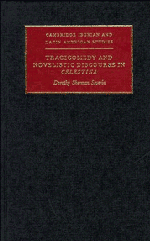Book contents
- Frontmatter
- Contents
- List of illustrations
- Preface
- Abbreviations
- 1 Introduction: Celestina and novelistic discourse
- 2 The prefatory material: the author's ambivalent intentions
- 3 Genre and the parody of courtly love
- 4 From parody to satire: clerical and estates satire
- 5 Verbal humour and the legacy of stagecraft
- 6 The rhetorical shift from comedy to tragedy: ironic foreshadowing and premonitions of death
- 7 Is Melibea a tragic figure?
- 8 Pleberio's lament, Cárcel de Amor, and the Corbacho
- 9 Conclusion: Rojas' ambivalence towards literature
- Notes
- Bibliography
- Index
- CAMBRIDGE IBERIAN AND LATIN AMERICAN STUDIES
9 - Conclusion: Rojas' ambivalence towards literature
Published online by Cambridge University Press: 05 March 2012
- Frontmatter
- Contents
- List of illustrations
- Preface
- Abbreviations
- 1 Introduction: Celestina and novelistic discourse
- 2 The prefatory material: the author's ambivalent intentions
- 3 Genre and the parody of courtly love
- 4 From parody to satire: clerical and estates satire
- 5 Verbal humour and the legacy of stagecraft
- 6 The rhetorical shift from comedy to tragedy: ironic foreshadowing and premonitions of death
- 7 Is Melibea a tragic figure?
- 8 Pleberio's lament, Cárcel de Amor, and the Corbacho
- 9 Conclusion: Rojas' ambivalence towards literature
- Notes
- Bibliography
- Index
- CAMBRIDGE IBERIAN AND LATIN AMERICAN STUDIES
Summary
What, can we conclude, was Rojas' attitude towards literature? All of the literary models fail at the end of the work: courtly love, classical antiquity, neo-stoicism, scholastic lore, aphorisms, even estates satire. But all the characters are using these models to serve their appetites. Celestina's aphorisms are used to pervert morality. Calisto's courtly posturing serves his lust. Melibea tries to justify her actions with classical examples. Pármeno and Sempronio disguise their self-interest behind student lore. Areúsa and Elicia hide behind the Archpriest of Talavera's satiric and parodic models, but at least they survive to tell the tale. Pleberio's neo-stoical posturing is exposed as a sham when he is visited with a genuine catastrophe.
To analyse the failure of literary models more closely, Melibea tries to justify her actions with classical examples, using a ‘worst-case’ analysis of her actions. In Act XVI she introduces a list of classical monsters of adultery, incest and bestiality – Venus, Myrrha, Semiramis, Canacea, Thamar, Pasiphae – to excuse her fornication. In Act XX she looks at murderers – Prusias, Ptolemy, Orestes, Nero, Philip, Laodice, Medea, Phrates – to justify her suicide. She carefully avoids the obvious comparison with other suicides. The other side of the coin is an emotional definition of her activity by popular and folkloric tyes. She will not be like the ‘bella malmaridada’, but rather compares herself with the abducted ‘niña de Gomez Arias’ who is sold in Moorish lands and whose mother would kill herself if she knew.
- Type
- Chapter
- Information
- Tragicomedy and Novelistic Discourse in Celestina , pp. 117 - 120Publisher: Cambridge University PressPrint publication year: 1989



